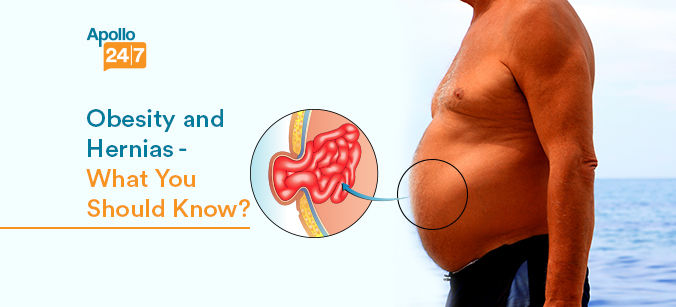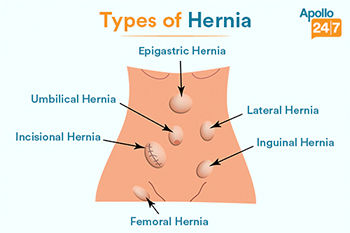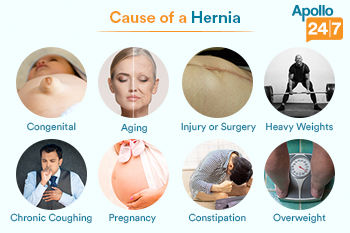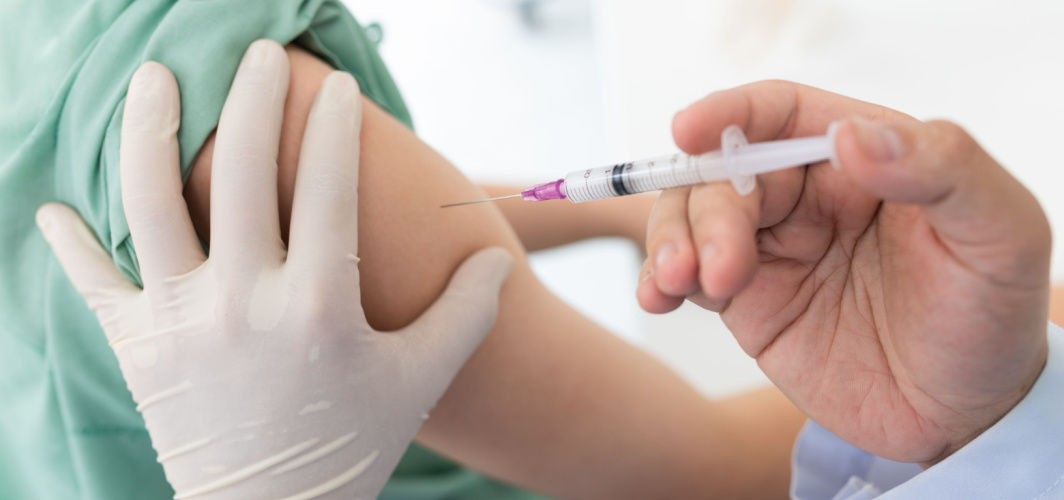General Health
Know About Hernia and Its Connection With Obesity
7 min read
By Apollo 24|7, Published on - 06 July 2022, Updated on - 27 December 2022
Share this article
0
7 likes

Hernia and obesity are interlinked each other. Generally, obesity causes several lifestyle diseases such as heart diseases, strokes, and diabetes. However, did you know it is also a major risk factor for hernias (protrusion of an organ pushing through the walls of muscles)?
Studies show a close link between obesity and increased risk of hernias, with special mention of inguinal hernias. Excess fat in the abdomen put pressure on abdominal walls making the abdominal wall weaker.
Because of weak abdominal wall, internal organs protrude or bulge through the weak spots on abdominal wall. If the weak spot is fixed using a mesh or other means of treatment methods, one can eliminate the serious complications that can be caused by a hernia. In case, hernia is not treated, it can lead to strangulation and incarceration.
What are the Common Types of Hernias?

Based on the location where hernias developed, they are of six [6] types.
- Inguinal hernia: Also called groin hernia. It occurs when a tissue or portion of the intestine pushes through a weak spot or tear in the lower abdominal wall. This can even occur in the inguinal canal that is in the groin.
- Femoral hernia: Femoral hernias are often noticed in women than in men. It develops when the tissue bulges through a weak point in the inner thigh or groin.
- Umbilical hernia: Umbilical hernias happen when the intestine or tissues or fat or fluids bulge through a weak spot near the belly button area or navel.
- Incisional hernia: Hernias that develop at the site of incision. An individual can have incisional hernia after undergoing abdominal surgery. It can occur months or even years after the surgery.
- Epigastric hernia: Epigastric hernias form when fat pushes through the weak part of the epigastric region or belly wall that locates between the belly button and breastbone.
- Hiatal hernia: A hiatal hernia occurs when a part of the stomach protrudes into the chest cavity through a weak point of the diaphragm.
Major Causes and Symptoms of Hernia
Hernia is a condition where internal organs or fat tissues, or muscles displace from their original position because of the weak muscle wall. This can make them to protrude or bulge through the weak spots of the muscle wall that helps them to hold in their original position.
Hernias occur not just because of a weak muscle wall. Some of the common causes of hernia among many are listed below.
- Overweight or obesity
- Pregnancy, especially having multiple pregnancies
- History of abdominal surgery
- Aging
- Damage to the abdominal wall due to an injury or accident
- Strenuous exercise or lifting heavyweights
- Constipation
- Chronic coughing or COPD

A hernia can produce a noticeable lump or bulge in the affected area. But the lump may seem to disappear when lying down. However, laughing, crying, coughing, straining during a bowel movement, or strenuous physical activity may make the lump reappear.
Here are most common symptoms of hernia. If you or your family members notice any of the below mentioned symptoms, we recommend consulting the best hernia specialist.
- Chronic pain around the herniated area
- Pain in the upper belly and belly button area
- Lump or bulge in the abdominal region or groin
- Discomfort and pain while lifting heavyweights
- Abdominal pain in the course of cough
In case of hiatal hernias, there are no bulges on the outside of the body. Instead, symptoms may include any of the following symptoms.
- Heartburn
- Indigestion
- Difficulty swallowing
- Frequent regurgitation [bringing food back up]
- Chest pain
Risk Factors That Increase Your Chances of Developing Hernia
The main risk factors of hernia include being pregnant and lifting heavy weights. There are certain risk factors that can make you prone developing a hernia. Those risk factors are:
- Being older or aging
- Persistent or chronic cough
- Chronic constipation
- Smoking
- Genetics or family history of hernias
Make sure you contact the best hernia specialist in case you doubt having any of these risk factors.
Hernia-obesity: Can Weight Reduction Help Hernia
Overweight or obesity is a significant risk factor of hernia. It can increase your chance of developing hernia by putting extra pressure and strain on abdominal muscles. As a result, you may find it difficult to perform day-to-day activities.
Weight reduction or losing weight can help in relieving excess pressure on the abdomen and thus lowers the severity of hernia symptoms. Also, it helps in avoiding the occurrence of severe hernia complications such as strangulation and incarceration.
Losing weight can also reduce the size of hernia and thus elevates the abdominal pain. In case of large of hernias, losing weight may not help to improve the severity of the condition. In such cases, surgery is the only option to treat it.
Prevent Hernia: 5 Ways to Prevent Hernia
Prevention is better than cure and treatment. With proper care, healthy diet, and right exercises, one can prevent development of hernia to a large extent. Regardless of age and gender, any individual can develop a hernia at certain point in their lifetime. So, we suggest every individual to follow preventive tips that are mentioned below.
- Use proper technique and wear supportive gear while lifting heavy objects.
- Maintain ideal weight by eating healthy food. For the same, you can consult our dieticians.
- Eat fresh fruits and vegetables that contain high fibre. This helps to avoid constipation, one of the risk factor for hernia.
- Avoid smoking to reduce persistent cough and pressure on the abdomen.
- Wear comfortable clothes instead tight fitting clothes.
Apart from these, there are many precautions that help an individual to prevent hernia. To know more about those, consult our best hernia doctors near you.
What Happens If Hernia Is Left Untreated?
If hernias are left untreated, they get bigger in size and cause severe pain. Also, they can lead to some serious health concerns which may require immediate surgical intervention.
In many cases, untreated hernia can become strangulated and lead to life-threatening conditions such as sepsis and necrotizing enterocolitis [severe intestine inflammation].
Remember, hernias won’t go away on their own. They need to be treated with proper care by an expert doctor. So, when you suffer from hernia symptoms, try consult a doctor and seek medical care immediately.
Best Method to Repair a Hernia: Hernia Repair Surgery
Hernia repair surgery is highly recommended to treat different types of hernias. Most surgeons repair hernia with the help of either open surgery or laparoscopic surgery.
Open hernia repair surgery
As the name suggests, open hernia repair surgery is performed by the surgeon through a significant incision in the abdomen. Once the hernia is repaired, the incision is closed through dissolvable stitches. One of the major disadvantage of open surgery is long recovery time. Individual who undergo open hernia repair surgery may take longer time to recover and heal completely.
Laparoscopic hernia repair surgery [Keyhole surgery]
In laparoscopic hernia repair surgery, the surgeon makes a few small holes or incisions or ports on the abdomen to insert a laparoscope. With the help of laparoscope and other surgical equipment, the surgeons will repair hernia by placing a mesh. Mesh helps in keeping the displaced internal organs in their original place and reinforces the weak abdominal wall.
Laparoscopic hernia repair surgery involves many benefits like no large incisions [minimally invasive], minimal or less blood loss, decreased risk of infection, and promotes quick recovery. Because of these benefits, many doctors are recommending laparoscopic hernia surgery to treat various types of hernias.
Listen to our experts on why it is better to get the hernia operated laparoscopically to relieve discomfort. Watch: Minimal Access Hernia Surgery: Types, Myths & Facts by Dr. Aloy Mukherjee, senior laparoscopic surgeon at Apollo Hospitals, Indraprastha, Delhi
Takeaway:
Hernia is a bulge caused by protrusion of internal organs against the weak muscle wall. It can occur because of many factors and obesity, pregnancy, and excessive pressure on abdomen are major risk factors among them. If hernia is not treated, it can cause severe pain, especially when you cough, bend over, or lift something heavy.
Hernias can be prevented with proper care, lifestyle modifications, and dietary changes. If hernia grows larger and causes discomfort in day-to-day life, seek immediate help from an expert hernia specialist.
Consult the Best Hernia Doctor in India
- Medically Reviewed By Dr. Dhanunjay Reddy B
General Health
Leave Comment
Recommended for you

General Health
Methylcobalamin Injection: Strategies for Effectively Managing Vitamin B12 Deficiency
Explore how to effectively manage and treat vitamin B12 deficiency through diet, supplements (methylcobalamin injection) and lifestyle changes.

General Health
Lower Abdominal Pain: Causes, Symptoms and Treatment
Discover the underlying causes, common symptoms and effective treatment options for lower abdominal pain. Learn how lifestyle factors and new technologies can help alleviate discomfort and improve your overall well-being.

General Health
5 Step Skin Care Routine For A Natural Glow
Having a daily skin care routine at home is crucial for achieving and maintaining glowing skin. Discover a comprehensive skin care routine for a natural glow. From cleansing to moisturizing, this blog provides expert tips and guidance for healthy and radiant skin.
Subscribe
Sign up for our free Health Library Daily Newsletter
Get doctor-approved health tips, news, and more.
Visual Stories

The Best Exercises for Controlling Blood Sugar Levels
Tap to continue exploring
Recommended for you

General Health
Methylcobalamin Injection: Strategies for Effectively Managing Vitamin B12 Deficiency
Explore how to effectively manage and treat vitamin B12 deficiency through diet, supplements (methylcobalamin injection) and lifestyle changes.

General Health
Lower Abdominal Pain: Causes, Symptoms and Treatment
Discover the underlying causes, common symptoms and effective treatment options for lower abdominal pain. Learn how lifestyle factors and new technologies can help alleviate discomfort and improve your overall well-being.

General Health
5 Step Skin Care Routine For A Natural Glow
Having a daily skin care routine at home is crucial for achieving and maintaining glowing skin. Discover a comprehensive skin care routine for a natural glow. From cleansing to moisturizing, this blog provides expert tips and guidance for healthy and radiant skin.